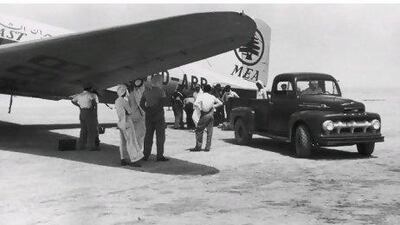The last time Egypt had a revolution, my mother was in Cairo's famous Shepheard's Hotel the day it caught fire on January 26 1952.
She survived by jumping out of a window and was driven away in an open-top MG by a Lebanese friend. All very glamorous, you might think, but where is he going with this? Bear with me.
She went on to work for Middle East Airlines (MEA) for nearly 50 years and during the latter years of the civil war ran the then-beleaguered airline's office at Heathrow Airport.
Apparently it was something of a golden age, a time when MEA was Lebanon's only link to the world. The company was more like a club and excess baggage was a relative concept.
"It's not the same any more," said a woman I met a few months back. "Today they weigh the suitcases. In your mother's day I could have got a donkey on board." (It lacks a bit in translation, but you get the point).
Did my mother lose the company money by turning a blind eye to loyal customers with a few extra kilos or was her own brand of PR a loss leader? Certainly I always suspected that without the special Lebanese treatment many passengers would have flown British Airways or, if they were in transit from the US or Canada, taken a cheaper European connection.
The world doesn't really work like that any more. MEA has certainly tightened its belt. It is more scrupulous about those extra kilos and it is less generous with its drink measures (although to be fair, back in the day they almost gave you the bottle, probably in anticipation of what lay in store or to soothe nerves frayed by what you may have just left behind).
The men with spreadsheets have by and large replaced the personalities. Gone are the days of the former chairman Selim Salam with his golf cap and Churchill cigars. Today a former central banker runs the airline but it is showing a profit.
Given the current mood in the Middle East, it would appear many people would also welcome replacing their "personalities" with a phalanx of laptop-wielding analysts from Booz & Company and McKinsey if it meant boosting the economy and creating jobs.
Hosni Mubarak was arguably the ultimate Arab personality but he had turned Egypt into a gerontocracy, a country run by men older than most of an adult population with an average age of 24.
The TV grab of the army high command meeting in an emergency session the day before Mr Mubarak stepped down suggested a leadership that was woefully out of step with the aspirations, not to mention the skills, of the social-networking revolutionaries who had occupied Tahrir Square.
At the risk of parroting all of the pundits on rolling-news TV, Egypt has much work to do. If it genuinely wants to "upgrade", as the Syrian president Bashar al Assad suggested all Arab countries do to avoid the "microbes" of stagnation, it will have to give the key jobs to people with relevant skills rather than retired army officers.
It is easier said than done. In Lebanon, a country that likes to sell itself as the region's hippest nation (even if there is a shortage of water, electricity, bandwidth and decent roads), the prime minister-elect Najib Mikati is trying to find a few technocrats of his own.
The now minority March 14 alliance has said it will not participate in the government, so Mr Mikati has to cull his new ministers from the ranks of the pro-Syrian majority March 8 alliance.
It is no easy task, especially when we read in the local media Damascus has expressed the hope that members of the pro-Syrian groupings - the Baath party, the Syrian Social National Party and the Nasserite Party - would be represented in the new cabinet.
Only Michel Aoun's Free Patriotic Movement has styled itself as a party standing for a new, clean and technocratic Lebanon, but then Mr Aoun's choice of political bedfellows has done much to dilute the credibility of his progressive manifesto.
Being "on message" has never been a Lebanese strength. One March 8 politician whose name is being touted for the culture portfolio has been roundly criticised in recent years for his questionable quarrying activities.
And staying with the green theme, the departing environment minister Mohammad Rahal was quoted last year as saying the rampant quarrying that has blighted much of Lebanon's mountain landscape to sate the seemingly endless construction boom was a good thing because, wait for it, it contributed to the economy.
In all honesty, Lebanon's only genuine technocrat is Riad Salameh, the governor of the central bank (which, incidentally, owns 99.5 per cent of MEA). The Lebanese pound has been stable for nearly 20 years and in times of crisis, it is his mobile phone the Grand Serial calls when seeking assurances.
Mr Salameh is the toast of the central banking community for the way he has kept Lebanon afloat and in 2009 was voted Central Banker of the Year.
He is a slick and efficient operator who has skilfully navigated Lebanon's treacherous sectarian waters because, at the end of the day, Lebanon is about money and the country's political class knows this.
One of his predecessors, Edmond Naim, displayed a different brand of devotion by locking himself in the bank and sleeping next to the bank's gold reserve to protect it from marauding militias during the civil war.
It's the sort of thing my mother might have done.
Michael Karam is a communications and publishing consultant based in Beirut

